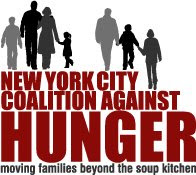Amid sobering news of a deflating economy, Wall Street Journal columnist Brett Arends urged readers to start investing in their kitchen pantries. Arends compared current food cost inflation with the spike in gas prices earlier this decade, while warning that the reality of food shortages could catch many consumers unprepared, like $4 gallons of gas. “The emerging bull market in agricultural products is following in the footsteps of oil. A few years ago, many Americans hoped $2 gas was a temporary spike. Now it's the rosy memory of a bygone age,” said Arends. Attributing rising food costs to the demands of the biofuels industry and of the growing middle class in
Providing news and commentary on issues facing the City's anti-hunger community

The New York City Coalition Against Hunger represents New York City’s over 1,200 soup kitchens and food pantries and the 1.3 million low income New Yorkers who are forced to use them. The Coalition works to meet the immediate food needs of low-income New Yorkers and enact innovative solutions to help them move “beyond the soup kitchen” to self-sufficiency.
Blog Archive
-
▼
2008
(116)
-
▼
April
(19)
- Amid Growing Inequities, Wall Street Journal Tells...
- Rice Rations Indicate Further Trouble for Food Eco...
- Calorie Posting Law Brings a Shot of Nutritional R...
- Courting Supermarkets, City Turns to Pennsylvania ...
- Despite Deadlines Farm Bill Debate Proves Intermin...
- CSAs Offer Mutual Benefit for Farmers and Low-Inco...
- Judge Upholds Decision To Require Calorie Postings
- 50 city green carts to roll out fruit, veggies for...
- Rampant inflation on grocery aisles prompting city...
- Complexity be damned: the Farm Bill explained
- Food Costs Rising Fastest in 17 Years
- State Cuts Hunger Funding by 16% Despite Current F...
- Consumers Edit Grocery Lists as Prices Soar
- PBS Hunger Series Will Feature Brooklyn Pantry
- Bringing Food to the Presidential Race
- Executive Director Berg Urges Council’s Commitment...
- With Lack of Food Comes Loss of Choice
- Consistent Healthy Eating Linked to Academic Achie...
- As Food Stamp Enrollment Rises, a Call for Accurat...
-
▼
April
(19)
No comments:
Post a Comment